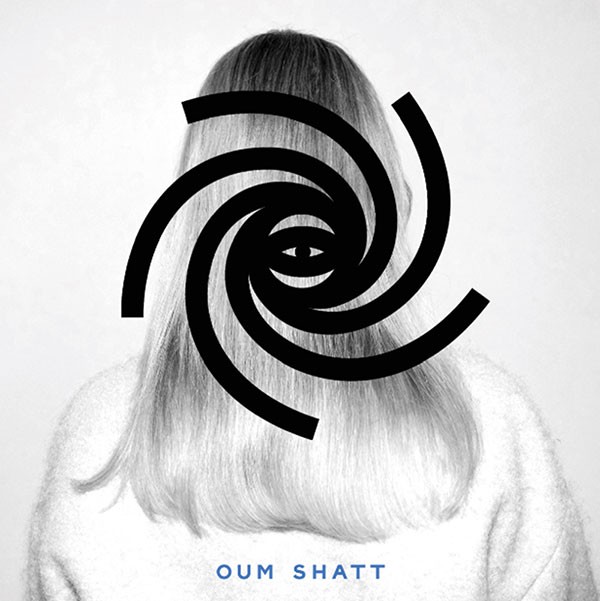Oum Shatt “Oum Shatt”
 Oum Shatt
Oum Shatt
“Oum Shatt”
(Snow White Records / Rough Trade)
It’s about time, that this album is finally being released: Oum Shatt have been around for over three years, and many of you have probably seen them live already. Not necessarily in your neighborhood, because from the start Oum Shatt have been playing international festivals like Transmusicales or Fusion. That is nothing to be taken granted for bands from Germany (but it certainly is for drummer Chris Imler: his most dedicated fanbase is in Italy, I think), but Oum Shatt do not fit into the German Indie Pop model anyway.
Beginning with the fact, that Jonas Poppe, Chris Imler, Jörg Wolschina and Richard Murphy are “old hands“: Jonas Poppe once had this interesting, but criminally overlooked band Kissogram; Wolschina was/is guitarist of Der Elegante Rest; Richard Murphy usually plays with Michael Knight; listing Imler’s band-involvements would be to long here. The diverse backgrounds and experiences account in total for the most laid-back and most passionate music (love the contradiction), you have heard in a long time. Its most striking feature of the Oum-Shatt-Sound is the use of arabic harmonies and rhythms. According to Poppe the band name is a bow to the singer Umm/Oum Kalthoum, who was deemed the „Egyptian Callas“ (generally a lot of homage is being paid to women on this album: see song titles like “Power to the Women of the Morning Shift“, “Madame O“, “Silent Girl“). Furthermore there are Wave-, Surf-, and stripped down Rock’n’Roll-ingredients: dark base lines, spiraling synthie-intros, Jonas Poppe’s melancholic vocals and crystal clear guitar parts (for the experts: based on the Phrygian scale). “Egyptian Reggae“ meets Franz Ferdinand, to be very very brief, but comparisons are not very useful regarding Oum Shatt. The tracks are complex and elaborately constructed – and at the same time how this all can drift off into ecstatic improvisations live – Imler at the drums is ready to erupt at all times, which is even omnipresent in the album versions of the songs. “Oum Shatt“ are fanning out a complete cycle of references and images, from Film Noir soundtracks to „Lawrence of Arabia“ to the run-down Western Berlin of the 1980s – place- and timeless in the best sense, although Poppe does offer comments to the present in his lyrics (e.g. the stock exchange crashes, while he is in bed with Madame O).
Personally, I’m very grateful for this album, but there is one thing I can’t forgive you, Oum Shatt: That you get me to perform awkward pseudo belly dance movements to songs like „Hot Hot Cold Cold“ or „Gold to Straw“, while you are looking as cool as Clark Gable.
Christina Mohr
The super group from Berlin, that’s being talked about. Jonas Poppe, former Kissogram, wrote the songs, other members of the band are the Staatsakt artist Chris Imler, Hannes Lehmann from Contriva and Jörg Wolschina (Der Elegante Rest). Much of what I wanted to say here had already been written on Intro, Spiegel.de or Laut.de. “Everything has been said, but yet not from everyone“ (Karl Valentin).
On Spiegel.de it has being talked about “glamorous slackness“, what also crossed my mind while listening to it (and what appeals to me as a good phlegmatic person). What’s interesting is, that the slackness is being retained once the music gets more dynamic, like in the amazing “Tripped Up / Laid Low“, which ich quite ambitious in a rhythmic regard, although the music does not SOUND ambitious at all. I recall an old Spex review by Michael Ruff about Yeah Yeah Noh, in which he wrote: “If there is something like a wall of sound, this here is a mesh wire of sound.“ This sentence can perfectly be transferred on Oum Shatt. Notwithstanding all the intricacies, that distinguishes this music, the sound remains mostly transparent. The guitars describe winding trajectories, which almost appear like arabesques set to music. I don’t know if the oriental influence, that has been attributed to the band in reviews has any relation to this (because I can’t describe what is meant by this). Is it possible, that Oum Shatt just listened to a lot of „Egyptian Reggae“ from Jonathan Richman? The first song “Power to the Women of the Morning Shift“ is evocative of this. It’s quite the hit, thanks to the pointed guitar motif and the lyrics, where it however remains unclear in which trade the women are working in the morning shift – a great pity. The band cultivated a preference for the cryptic, which is shown in the lyrics as well as in the cover aesthetics. The lyrics for „Hot Hot Cold Cold“ (musically the least slackly song!) could for example be written from a guitar’s point of view. On the cover photos people (probably the band members) are almost exclusively partly. The focus is rather lying on graphic design and form then on accuracy and clarity. By staging themselves so demonstratively as a cool band, the record sounds even better!
Mario Lasar














